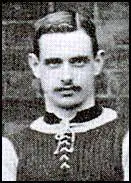Jimmy Crabtree

James (Jimmy) Crabtree was born in Burnley on 23rd December 1871. A talented wing-half, Crabtree joined Burnley in August 1889. Over the next five years he played in 72 games for the club.
On 3rd March 1894, Crabtree won his first international cap for England against Ireland. The England team that day also included John Devey, Dennis Hodgetts, Fred Spiksley, Jack Reynolds, Johnny Holt, Joe Reader, Bob Holmes, and Bob Howarth. The game was drawn 2-2.
In August 1895, Crabtree was transferred to Aston Villa for a fee of £250. It has been claimed that this was the first-time that money had changed hands between football clubs for a professional player. That season the club won the First Division title. Crabtree played in 25 league games and was a great success. Tony Matthews described Crabtree in his book, Who's Who of Aston Villa as: "A hard tackler, clever at close quarters and equally reliable in open play, he was cool, resourceful and brainy. He excelled in the finer points of the game and was one of the most versatile players in the country, being unrivalled in the left-half position for many years."
Aston Villa retained the title the following season by beating the runners-up, Sheffield United, by an amazing 11 points. Aston Villa scored 73 goals that season with George Wheldon (18), John Devey (17), Johnny Campbell (13),Charlie Athersmith (8), John Cowan (7) being the main contributors. As Philip Gibbons pointed out in Association Football in Victorian England: "Aston Villa had twice won the League Championship, as well as the FA Cup, during the three previous seasons, with a team generally acknowledged as the finest in the land."
On 30th January, 1897, Aston Villa beat Newcastle United 5-0 in the third round of the FA Cup. They went onto beat Notts County (2-0), Preston North End (3-2) and Liverpool (3-0) to reach the final against Everton. A crowd of 60,000 arrived at Crystal Palace to watch the final. Charlie Athersmith scored the opening goal but Everton hit back with goals from Jack Bell and Richard Boyle. Aston Villa continued to dominate the game and added two more from George Wheldon and Jimmy Crabtree. That finished the scoring and therefore Aston Villa had emulated the great Preston North End side that had achieved the FA Cup and Football League double in 1888-89 season.
Before the beginning of the 1897-98 season, Aston Villa lost the services of Johnny Campbell and Jack Reynolds, who both decided to join Celtic in the Scottish League. During the opening month of the campaign, Howard Spencer sustained a serious leg injury that kept him out of the team for the rest of the season. Aston Villa missed these three key players and could only finish in 6th place in the league. They was also knocked out of the FA in the first round by Derby County. Crabtree played in 25 out of 30 league games that season.
Aston Villa was back in form the following year. Two new players emerged that season: George Johnson and Billy Garraty. However, it was John Devey who was the star of the side scoring 21 goals in 30 games. George Wheldon also did well with 16 in 33. Villa once again won the league title, with Liverpool taking the runners-up spot. Crabtree played in 31 league games that season.
Aston Villa confirmed it was the best club in England during the 1890s when it won the First Division championship the following season. This was their fifth league title in seven years. During this period they had also won the FA Cup twice (1895 and 1897). Billy Garraty was the top scorer in league and cup games in the 1899-1900 season with 31 goals.
Crabtree won his last international cap for England on 3rd March, 1902, against Wales. The England team that day also included Ernest Needham, Bob Crompton and Steve Bloomer. The game was drawn 0-0. Over an eight year period, Crabtree won 14 caps playing for his country.
After playing 202 games for Aston Villa, Crabtree was transferred to Plymouth Argyle in January 1904. He retired from playing five months later. Crabtree then coached several non-league clubs before becoming the licensee of the Royal Victoria Cross in Birmingham.
Jimmy Crabtree, who had a serious drink problem, died on 31st March, 1908, at the age of 36.
